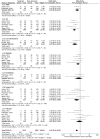Outcomes of venoarterial extracorporeal membrane oxygenation for refractory cardiogenic shock: systematic review and meta-analysis
- PMID: 30854307
- PMCID: PMC6379189
- DOI: 10.21037/acs.2018.11.09
Outcomes of venoarterial extracorporeal membrane oxygenation for refractory cardiogenic shock: systematic review and meta-analysis
Abstract
Background: Despite advances in management techniques and medical therapy, refractory cardiogenic shock remains a life-threatening condition with high mortality rates. The present systematic review and meta-analysis aims to explore the outcomes associated with venoarterial extracorporeal membrane oxygenation (VA-ECMO) use in the setting of refractory cardiogenic shock, stratified per survivorship.
Methods: A literature search was performed using three electronic databases from the date of their inception up to June 2018. The literature search and subsequent data extraction were performed by two independent reviewers. Digitized survival data were extracted from Kaplan-Meier curves in order to re-create the original patient data using an iterative algorithm and were subsequently aggregated for analysis.
Results: Fifty-two studies were included, with 44 undergoing quantitative analysis. A total of 17,515 patients were identified, with a mean age of 58.4±9.4 years and a mean duration of ECMO support of 5.1±2.6 days; 68.7% of the patients were male. Aggregated survival rates at 1, 2, 3 and 5 years were 36.7%, 34.8%, 33.8% and 29.9%, respectively.
Conclusions: The present systematic review illustrates the expected survival results for VA-ECMO in the intermediate- to long-term. Extended follow-up and standardized reporting measures are urgently needed in order to carry out more definitive subgroup analyses.
Keywords: ECLS; Extracorporeal membrane oxygenation (ECMO); refractory cardiogenic shock.
Conflict of interest statement
Conflicts of Interest: The authors have no conflicts of interest to declare.
Figures



References
-
- Dorson W, Jr, Baker E, Cohen ML, et al. A perfusion system for infants. Trans Am Soc Artif Intern Organs 1969;15:155-60. - PubMed
